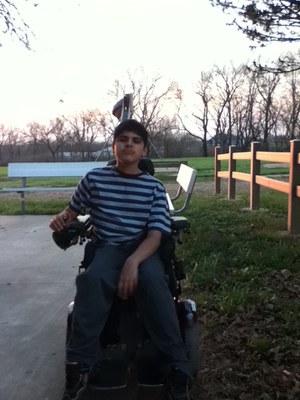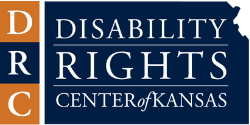Community Integration
DRC helps client stay out of institution

Imagine that your physical impairments as a parent do not allow you to provide the life-sustaining care your child needs. Now imagine you have another child with a disability and you are trying to care for them both. This was everyday life for Faraj’s parents. Faraj Chaaban and his brother both have a diagnosis of Cerebral Palsy. His parents contacted DRC because they were no longer able to care for him and needed home and community based services.
DRC provided services to Faraj’s parents, including technical support and free legal advice about extra medical services available through the Medicaid Early and Periodic Diagnosis Screening and Treatment (EPSDT) program. EPSDT is a unique child health component of Medicaid that is designed to meet the special physical, emotional, and developmental needs of children. Under the EPSDT federal law, special rights and access to greater services are granted to children and youth under the age of 21 and it requires the state’s Medicaid plan to cover a comprehensive set of benefits. Unfortunately, EPSDT is not well advertised by the state of Kansas. Many parents and doctors are unaware that EPSDT services even exist.
A DRC attorney worked closely with Faraj’s doctor to inform him about EPSDT. DRC prepared an appropriate checklist for the doctor to fill out in order to obtain Medicaid authorization for Faraj to receive services in his home. Faraj was also denied services under the DD Waiver and had been put on the statewide waiting list. Today in Kansas, individuals on the DD Waiver waiting list can wait upwards of 10 years for services. Fortunately, there is a crisis exception to the waiting list for those who are at imminent risk of institutionalization. Faraj’s parents applied for crisis funding but were denied because he lives with them. Due to their disabilities, Faraj’s parents cannot lift more than 50 pounds, which prevents them from providing Faraj with the care he needs. Besides the day-to-day care that Faraj needed, he had recently undergone a 14-hour surgery which required a great deal more care. His parents could not provide this level of care for Faraj while continuing to care for their other child with Cerebral Palsy, and go to work.
With help from a DRC Advocate, Faraj’s physician stated more clearly in a revised letter specifically identifying the scope of services Faraj required for the crisis-funding request. The local Community Developmental Disability Organization (CDDO) reviewed the revised letter and approved Faraj for crisis funding services. The services will provide in home care for Faraj which will prevent him from being institutionalized. His parents credit DRC’s advocacy with obtaining EPSDT and HCBS Waiver services, as they previously ran into numerous road blocks. With DRC’s legally based advocacy, Faraj avoided expensive and unnecessary institutionalization and continues to live at home with his parents and younger brother while receiving assistance through the HCBS DD Waiver.
DRC Helps Client Obtain Services in Case
“Ryan” (name changed to protect identity) is a 19 year old with multiple disabilities, including Autistic Spectrum Disorder, Obsessive Compulsive Disorder, Attention Deficit Hyperactivity Disorder, Epilepsy, Psychotic Disorder NOS, Asthma and Intellectual Disability. His parents are co-guardians. Ryan requires almost continuous monitoring, care, and support from professional support staff due to his multiple disabilities. Ryan was admitted to Lakemary Center, a private residential treatment center (PRTF), in early 2010 due to aggressive behaviors which were a manifestation of his disability. These issues made him danger to himself and others. PRTF admissions and treatment are meant to be short-term with reassessments every 60 to 90 days to determine whether a resident meets the criteria for continued stay. Upon discharge from Lakemary, Ryan would require continuous monitoring and care in order not to be a danger to himself or others. Ryan applied for the Developmental Disability (DD) Waiver, but he was placed on the waiting list and would have to wait, literally, for several years in order to clear the list and receive services. As PRTFs are short term treatment facilities, Ryan could not continue to stay at Lakemary until he comes off the waiting list. The Catch-22 is that without DD waiver services Ryan will be unable to live independently without becoming a danger to himself or others, thus he will require re-institutionalization. One area where DRC provides services is to assert individual’s rights under the US Supreme Court’s landmark Olmstead decision. Under Olmstead, among other things, unnecessary institutionalization is considered discrimination and individuals have the right to be served in the most integrated setting, particularly when they are at risk for institutionalization. Before contacting DRC, Ryan had filed two separate requests for crisis funding on the DD Waiver, both of which were denied by the State. DRC worked with Ryan and filed a request for an administrative hearing. DRC attorneys also sent a case summary to the Civil Rights Division of the U.S. Department of Justice per its request for clients who have Olmstead claims. DRC believed Ryan had a potential Olmstead claim, because he was being denied DD Waiver services even though he was at risk to be institutionalized. In February, 2012, DRC attorneys and the State of Kansas reached a settlement in the appeal. Ryan is now receiving DD Waiver services and avoiding unnecessary institutionalization.
.png)





